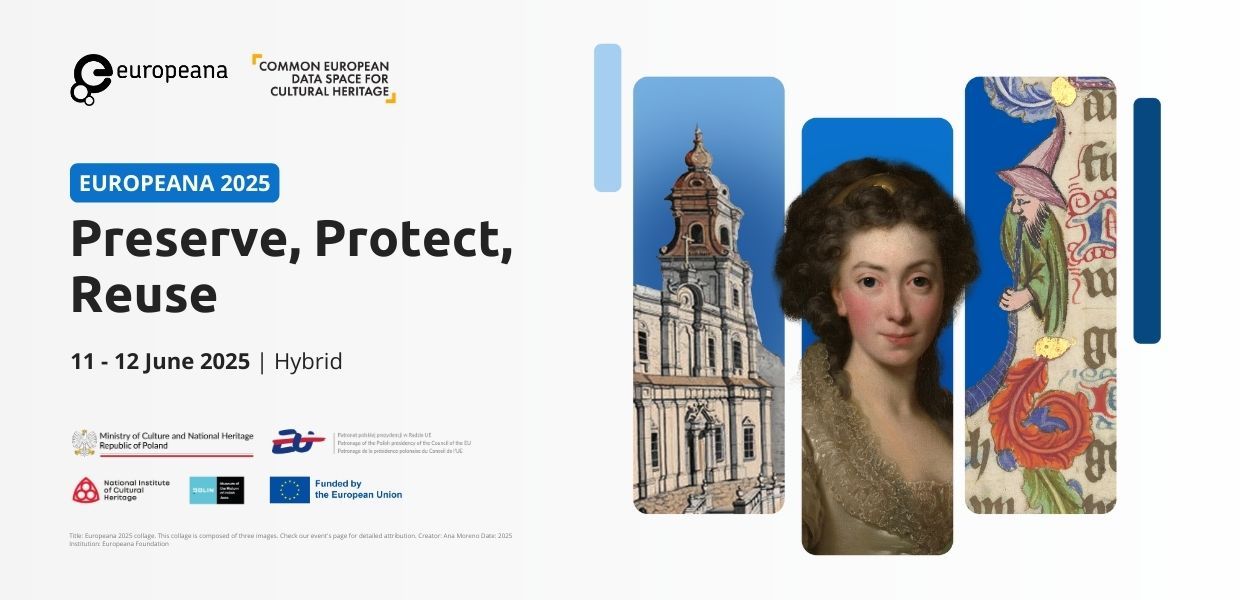The Europeana conference is a leading event in the world of digital cultural heritage and a flagship of the common European data space for cultural heritage. This year’s edition, Europeana 2025 - Preserve, Protect, Reuse will take place from 11 - 12 June in Warsaw, under the patronage of the Polish Presidency of the Council of the EU, and we can’t wait to see you there!
In honour of Europe Day - held on 9 May every year to celebrate peace and unity in Europe - we spotlight five topics of particular relevance to Europe and its heritage that will be in focus at the event.
1. The common European data space for cultural heritage
The common European data space for cultural heritage will be a central focus of Europeana 2025 - the red thread running throughout the two day programme. Building on the Europeana Initiative, it is the most advanced of the European Commission’s 14 sectoral data spaces in fields like tourism, energy, health and, of course, cultural heritage.
Europeana 2025 will offer you the opportunity to discover what the data space means for you, how it benefits your work, why it matters for Europe and the sector, and how you can get involved. Panel sessions will explore how the data space, as a decentralised, value-based and citizen-first infrastructure, can enable Europe to shape its digital future; and how we can open it up to enable and scale the reuse of heritage data across sectors and data spaces. Afternoon sessions, meanwhile, will unpack work being undertaken across the data space - from AI innovation to 3D technologies, to community and capacity building. And in a dedicated session, we will explore a story that’s not only European, but distinctly Europeana: how we’re scaling up the common European data space for cultural heritage.
2. European collaboration
The data space for cultural heritage is all about participation and collaboration. As the conference turns the spotlight on the data space, it will also feature interventions from initiatives across the European digital cultural heritage ecosystem, including the Tourism data space, ECHOEs, the Time Machine Organisation and other EU-funded initiatives, to explore how we can work together to create a unified digital heritage landscape in Europe.
For those interested in developing collaborations, an intervention by Rehana Schwinninger-Ladak - Head of Unit, Interactive technologies, Digital for Culture and Education, DG CNECT, European Commission will be a great opportunity to discover the EU’s priorities for the ecosystem, while a moderated panel discussion on ‘Funding the future: opportunities for digital heritage’ will uncover current and upcoming funding streams across the sector. And an in person conference Fair will be a great chance to look for possible collaborations with EU-funded projects and experts from across the data space!
3. The Polish perspective
We are delighted that Europeana 2025 is taking place under the patronage of the Polish Presidency of the Council of the EU, in collaboration and partnership with the Ministry of Culture and National Heritage of Poland, the National Institute of Cultural Heritage and the POLIN Museum of the History of Polish Jews in Warsaw, who will host the conference. The expertise and perspectives of Polish colleagues will be in the spotlight at the conference, and we are especially honoured that Hanna Wróblewska - Minister of Culture and National Heritage of the Republic of Poland - will join us at the high-level opening and scene-setting.
The conference will offer a unique opportunity for peer-learning, with insights from Polish institutions, including the Department of Media and Creative Sectors in the Ministry of Culture and National Heritage of Poland, Centrum Cyfrowe, POLIN Museum and the Polish National Institute of Cultural Heritage. Participants will have the chance to learn directly from Poland’s experience as chair of the Council of the EU, gaining unique insights into their priorities and vision for the European cultural heritage landscape.
4. European solidarity with Ukraine
As part of Europeana’s efforts to support the Ukrainian digital heritage sector, and of course in close collaboration with the conference’s Polish hosts, Europeana 2025 will put the spotlight on the inspiring work of our colleagues working to protect Ukraine’s cultural heritage. In particular, the conference’s Policy Forum will highlight the protection of Ukrainian heritage, and we are hopeful for the physical attendance of Anastasia Bondar, Deputy Minister for Digital Development of Ukraine, in a conversation facilitated by Sofie Taes, Chair of the Europeana Working Group on Supporting the digital cultural heritage of Ukraine Working Group.
Further moderated discussions with speakers from the HATA Hub, Ukrainian Heritage Monitoring Lab, Museum of Stolen Art and Pixelated Realities will explore how we can engage the tech sector and community for heritage digitalisation in times of war, sharing experiences and learning from Ukraine.
5. A green, social and digital Europe
Europe and the world are undergoing rapid transformations - from the rise of AI to socio-political challenges, harrowing wars, and a stark climate crisis. Europe aims to master these changes through a bold, concerted 'triple transition'—digital, social, and green. This triple transformation is another thread that runs through the conference, but is particularly captured in the session on the afternoon of 12 June: ‘Cultural heritage towards a green, social and digital Europe.’
This session will present a crucial analysis of current digital preservation practices in cultural heritage institutions across Europe; highlight the DIGICHer project which explores the factors driving the digitisation of cultural heritage for minority groups; and the possibilities and challenges of open sharing of vulnerable cultural heritage - all aspects of a social, digital and green transformation of cultural heritage and Europe. Don’t miss your chance to join the discussion!
Get your ticket now
All sounding good to you? Then don’t miss your chance to get your ticket now!
While you can access the conference online, to unlock all of the opportunities it has to offer, we encourage you to join us in Warsaw to discover this vibrant European city and opportunities for collaboration across the continent.



